Chaya Soro 2023: Learner vs. Earner
by devadmin | November 9, 2023 9:08 pm
Let’s begin with mazel tov wishes to our friends Wendy and Chaim Frucher upon the wedding this coming Sunday -with the Ois and eishes chayil in attendance- of their beautiful daughter Carlie, who will be escorted to the chuppah to marry Josh Chesner, he the son of Tammy and Danny Chesner. Mazel tov to both extended families and may the soon to be newlyweds merit to build a beautiful life together.
—————————————————————————————————-
Learner vs. Earner
Welcome to Parshas Chaya Soro, where in years past and in years to come, thousands of people -mostly males- pour into the city of Chevron over in Israel to remember our foremother Soro who has shared center stage these past few weeks. This year, our holy brothers are preoccupied with war activities and we begin by wishing them complete victory over their enemies.
Most of the parsha is devoted to the search for a wife for Avrohom and Soro’s son, Yitzchok. Eliezer, Avrohom’s trusted servant, is deputized to get the job done. We have previously covered his mission, all that occurred to him along the way, and while there. Check out archives at https://www.Oisvorfer.com.
As the heylige Ois was scanning the parsha this past shabbis, something he typically does in reverse order, he got stuck on the very last posik of the parsha, and on an event that took place at the end of Eliezer’s mission. We shall cover both and let us begin with a most interesting pshat written over 700 years ago by the Baal Haturim on the last five words in the very last posik of the parsha. Let me shout out chaver Yossie Singer who reminded me on Wednesday morning of this amazing pshat. To chap it, let us begin here.
The last six pisukim of our parsha are dedicated to the offspring of Yishmoel. Those who read me weekly know that Yishmoel has gotten extensive coverage these past two weeks. In each of the last three parshas, Yishmoel plays a prominent role: in Lech Lecho Yishmoel is born with the promise to Avrohom that he would be a great nation. Last week in Vayero, Soro insisted that Avrohom send him away. Finally in Chayei Soro, his life ends and his progeny documented. Soro was not Yishmoel’s mother; indeed, she caused him to be banished from her home. Why the RBSO placed his final legacy in a parsha named Chaya Soro, ver veyst? Was sending him away the best thing that happened to him? Ver veyst? The bottom line: The heylige Toirah tells us -again- whom he married, the names of his children, where they lived, and how old Yishmoel was when he died. Not a terrible sendoff, let us read the pisukim inneveynig.
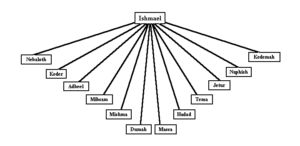
| 13 And these are the names of the sons of Ishmael by their names, according to their births: the firstborn of Ishmael was Nebaioth, and Kedar and Adbe’el and Mibsam, | יגוְאֵ֗לֶּה שְׁמוֹת֙ בְּנֵ֣י יִשְׁמָעֵ֔אל בִּשְׁמֹתָ֖ם לְתֽוֹלְדֹתָ֑ם בְּכֹ֤ר יִשְׁמָעֵאל֙ נְבָיֹ֔ת וְקֵדָ֥ר וְאַדְבְּאֵ֖ל וּמִבְשָֽׂם: | |
| 14 And Mishma and Dumah and Massa, | ידוּמִשְׁמָ֥ע וְדוּמָ֖ה וּמַשָּֽׂא: | |
| 15 Hadad and Tema, Jetur, Naphish, and Kedmah. | טוחֲדַ֣ד וְתֵימָ֔א יְט֥וּר נָפִ֖ישׁ וָקֵֽדְמָה: | |
| 16 These are the sons of Ishmael, and these are their names in their open cities and in their walled cities, twelve princes to their nations. | טזאֵ֣לֶּה הֵ֞ם בְּנֵ֤י יִשְׁמָעֵאל֙ וְאֵ֣לֶּה שְׁמֹתָ֔ם בְּחַצְרֵיהֶ֖ם וּבְטִֽירֹתָ֑ם שְׁנֵֽים־עָשָׂ֥ר נְשִׂיאִ֖ם לְאֻמֹּתָֽם: | |
| 17 And these are the years of the life of Ishmael: one hundred years and thirty years and seven years; and he expired and died and was gathered to his people. | יזוְאֵ֗לֶּה שְׁנֵי֙ חַיֵּ֣י יִשְׁמָעֵ֔אל מְאַ֥ת שָׁנָ֛ה וּשְׁלשִׁ֥ים שָׁנָ֖ה וְשֶׁ֣בַע שָׁנִ֑ים וַיִּגְוַ֣ע וַיָּ֔מָת וַיֵּאָ֖סֶף אֶל־עַמָּֽיו: | |
| 18 And they dwelt from Havilah to Shur, which borders on Egypt, going towards Asshur; over all his brothers he dwelt. | יחוַיִּשְׁכְּנ֨וּ מֵֽחֲוִילָ֜ה עַד־שׁ֗וּר אֲשֶׁר֙ עַל־פְּנֵ֣י מִצְרַ֔יִם בֹּֽאֲכָ֖ה אַשּׁ֑וּרָה עַל־פְּנֵ֥י כָל־אֶחָ֖יו נָפָֽל: |
Summary: The parsha concludes with the chronicles of Yishmoel. It delineates his twelve children, who become twelve princes that established the Arabian nations. The RBSO’s promise to Avrohom has been fulfilled. Yishmoel dies at the age of 137.Ober, let us re-read the bolded and enlarged last five words of the last posik and let us also read what one commentator, the Baal Haturim had to say -seemingly prophetically- on these very words over 700 years ago.
על פני כל אחיו נפל וסמיך ליה ואלה תולדות יצחק לומר כשיפול ישמעאל באחרית הימים אזי יצמח בן דוד שהוא מתולדות יצחק:
Shoin, given that you spent so many years in the yeshiva system and still cannot read and certainly not understand the words as written above, let’s do that in English. On the words “Ober his brothers he dwelt,” said the Baal Haturim” azoy: “This is juxtaposed with the first three words of next week’s parsha which begins with listing the offspring of Yitzchok. This teaches us that when Yishmoel’s descendants fall in the ‘end of days,’ then (Moshiach) descendant of King David, of the offspring of Yitzchok will sprout (flourish).”
The bottom line: we need his decadents to fall before the Yiddin can leave in peace and harmony. Are we there yet? The events of the last thirty plus days suggest not yet, that his descendants -some of them very bad- are not yet down and out. When is Moshiach coming? Ver veyst?! Based on the Baal Haturim, he will fall “…at the end of days…” Now, would not be a terrible time.
Let us close with Eliezer, Rivka and Yitzchok. Having identified Rivka the only candidate for Yitzchok -she was the daughter of his first cousin- and having negotiated with her family – showered her and them with gifts- the deal was done. As an aside, It appears that the gifting of jewelry to one’s prospective bride and avada once she becomes a bride, and for the rest of her life, seems to be rooted in the actions of Eliezer; he knew what it takes to get a girl; jewels! He also knew what it takes to get the parents to consent: gifts for them as well. Check out pisukim 22 and 53 below.
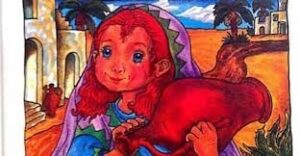
Shoin! Rivka saddled up for the ride back to Yitzchok’s home town to meet her husband to be. The action picks up at the very end of the parsha and let us read the relevant pisukim (Bereishis 24:63-65), where the heylige Toirah tells us azoy:
| 22 Now it came about, when the camels had finished drinking, [that] the man took a golden nose ring, weighing half [a shekel], and two bracelets for her hands, weighing ten gold [shekels]. | כבוַיְהִ֗י כַּֽאֲשֶׁ֨ר כִּלּ֤וּ הַגְּמַלִּים֙ לִשְׁתּ֔וֹת וַיִּקַּ֤ח הָאִישׁ֙ נֶ֣זֶם זָהָ֔ב בֶּ֖קַע מִשְׁקָל֑וֹ וּשְׁנֵ֤י צְמִידִים֙ עַל־יָדֶ֔יהָ עֲשָׂרָ֥ה זָהָ֖ב מִשְׁקָלָֽם: | |||
| 53 And the servant took out silver articles and golden articles and garments, and he gave [them] to Rebecca, and he gave delicacies to her brother and to her mother. | נגוַיּוֹצֵ֨א הָעֶ֜בֶד כְּלֵי־כֶ֨סֶף וּכְלֵ֤י זָהָב֙ וּבְגָדִ֔ים וַיִּתֵּ֖ן לְרִבְקָ֑ה וּמִ֨גְדָּנֹ֔ת נָתַ֥ן לְאָחִ֖יהָ וּלְאִמָּֽהּ: | |||
| 63 And Isaac went forth to pray in the field towards evening, and he lifted his eyes and saw, and behold, camels were approaching. | סגוַיֵּצֵ֥א יִצְחָ֛ק לָשׂ֥וּחַ בַּשָּׂדֶ֖ה לִפְנ֣וֹת עָ֑רֶב וַיִּשָּׂ֤א עֵינָיו֙ וַיַּ֔רְא וְהִנֵּ֥ה גְמַלִּ֖ים בָּאִֽים: | |||
| 64 And Rebecca lifted her eyes, and saw Isaac, and she alighted from the camel. | סדוַתִּשָּׂ֤א רִבְקָה֙ אֶת־עֵינֶ֔יהָ וַתֵּ֖רֶא אֶת־יִצְחָ֑ק וַתִּפֹּ֖ל מֵעַ֥ל הַגָּמָֽל: | |||
| 65 And she said to the servant, “Who is that man walking in the field towards us?” And the servant said, “He is my master.” And she took the veil and covered herself. | סהוַתֹּ֣אמֶר אֶל־הָעֶ֗בֶד מִֽי־הָאִ֤ישׁ הַלָּזֶה֙ הַֽהֹלֵ֤ךְ בַּשָּׂדֶה֙ לִקְרָאתֵ֔נוּ וַיֹּ֥אמֶר הָעֶ֖בֶד ה֣וּא אֲדֹנִ֑י וַתִּקַּ֥ח הַצָּעִ֖יף וַתִּתְכָּֽס: | |||
Let’s look at posik 63 again: “Yitzchok went out “la’suach” in the field toward evening and he raised his eyes and saw, and behold! camels were coming. And Rivka raised her eyes and saw Yitzchok, and she fell from the camel. She said to the servant, `Who is that man walking in the field toward us?’”
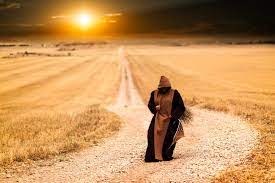
What did Rivka see? What caused her to lose her balance? Did she faint? Did she fall off, or, did she dismount? In yeshiva we were taught that the word וַתִּפֹּ֖ל -“va’tipoil”- means that someone fell. Of late, the Ois has seen the English translations of the word suggesting that Rivka alighted or dismounted on her own. What happened? Ver veyst? What impressed her so much that she fell off the camel and inquired as to the man’s (Yitzchok’s) identity? Was she not aware that she would be meeting Yitzchok? Was she too young to be riding a camel? Let’s recall that according to many, she was but three years of age. Did she not agree to the shidduch while back in her dad’s house? She did! What taka did she see?
Back in yeshiva we were taught that Yitzchok instituted afternoon prayers, what we call Mincha, the afternoon payer survive. Yes indeed: Though there was no such thing as organized davening, or any other type of davening for that matter in his times, nevertheless, what Yitzchok did that afternoon and what Rivka saw him doing, was davening. Why davening would make her fall off the camel, ver veyst? Did his shokeling make her dizzy? Or, was she shocked that she was about to be married to a thirty-seven year old man? Says the medrish, “She saw his hands outstretched in prayer, and she said, `This must certainly be a great man.’” In other words, the word “losuach,” found only once mamish here in our parsha and no place else in the entire heylige Toirah, means prayer, davening. How do we know this to be emes?
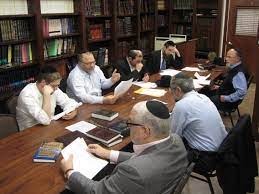
Nu, those who went through the yeshiva system avada recall learning that our forefathers -all three of them- kept and observed the entire heylige Toirah? How that was possible when there was no Toirah? What was there to keep if the Toirah was still hundreds of years away from being revealed and given? The answer: ver veyst? That being said, that is specifically what our sages have taught us; go prove otherwise. So happens that every question you might consider has been thought of and discussed by our sages; all bases covered. The bottom line: we know it’s the emes because the medrish so tells us; isn’t that enough for you? Can you prove them wrong? Not!
What made our sages suggest that Yitzchok was engaged in prayer? The heylige Gemora (Brochis 26b); see also Bereishis Rabba 60:14 interprets the term losucah basodeh as a reference to prayer, and thus infers that Yitzchok instituted the afternoon minchah service. He innovated minchah; case closed. And their proof? And does everyone agree? Also not, though a posik in Tehillim (102:1) – as cited in the heylige Gemora- speaks of an impoverished man praying, and describes his prayer with the phrase, “yishpoch sicho,” thus suggesting that the term si’ach denotes prayer. Accordingly, the Toirah here speaks of Yitzchok as going into the fields to pray. And taka, many, including Rashi, Rabbenu Saadia Gaon, Rabbenu Chananel and Seforno all agree: Yitzchok was not just davening but was specifically davening minchah.
Does everyone agree that Yitzchok was davening? And if they don’t and if he didn’t invent Mincha, why taka do we daven mincha? Can the word lo’suach have another meaning. Indeed it can and let’s find it. Let’s roll back to Parshas Bereishis (Bereishis 2:5) where we read this: “Now all the siach / trees of the field were not yet on the earth.” And? So what? Says the Rashbam that the word la’suach can mean “to plant” or to engage in some other agricultural labor. Both Rashbam and Chizkuni associate it with the term si’ach in reference to shrubbery. They interpret this verse to mean that Yitzchak had gone into his fields for the purpose of planting and supervising his employees. This excursion was not for prayer, but rather for agricultural work. According to this interpretation, Rivka saw Yitzchok working in the field.
Ober, why would she fall off her camel just because she saw him working the field? Was she -knowing that his father gave him his entire estate- expecting a retired millionaire but was shocked when her husband-to-be was but an ordinary farm hand? Coud be? Or, is pshat azoy: Did Rivka sign on because she thought she was marrying an earner but was shocked to see he’s a learner? That he’s spending his afternoon davening? Mincha? Zicher that’s enough to shock the system, even to faint and fall off a camel. Didn’t Eliezer -with Rvika listening in- tell her father Bisuel that Avrohom had bequeathed his entire estate to Yitzchok? He did! And now she arrives and finds him either praying or planting? Oy vey!
Which pshat is correct? Ober, who says the answers are mutually exclusive? Why couldn’t he be planting and also davening? Was Yitzchok not capable of multitasking? Was he the forerunner of the young -about-to-be married man splitting his time between learning and earning? The first learner/earner? Don’t you daven, look at your phone, send texts and WhatsApp’s, all the same time? Are you not but multi-tasking and emulating the ways of Yitzchok when Rivka spotted him?

And taka, says the Menachem Tziyon, that we might accept both interpretations; it is totally shayich (possible) that Yitzchok did both. That afternoon, he davened and tended to his fields. Wait, there’s more: It is perhaps this precise combination between work and prayer, the responsible concern for both his material and spiritual needs, that impressed Rivka when she set her eyes upon her future husband; taka very impressive for a girl her age. Rivka saw Yitzchok praying, and she saw him working in the field. And taka, if that’s what went down -besides Rivka off the camel- if Yitzchok was working in the field immediately prior to taking time out to daven mincha, he would have been the man. Our sages observe that minchah is made special by the fact that it interrupts the workday and thus requires a special commitment. Kudos to those who do so daily. She saw that he was a master of both pursuits, and that’s davka what impressed her. Gishmak!
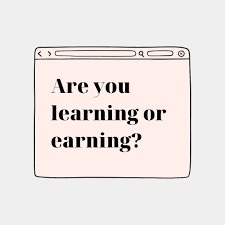
As an aside, and as mentioned, not everyone agrees that we daven Mincha because Yitzchok was out in the field talking to the RBSO. Our rabbis in the heylige Gemora debate whether the daily prayers – all three of them- have their origin in the behavior of our biblical patriarchs, or in the sacrifices brought daily in the Beis Hamikdash. According to the second opinion, the Mincha prayer is based on the afternoon tomid (daily) offering which was offered in the Temple each afternoon. The bottom line: you are not off the hook and must daven minchah daily!
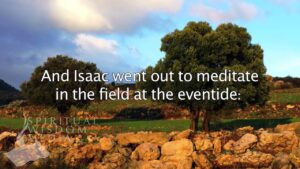
All that being said, who gave our sages license to take a word that appears only once in the heylige Toirah and decide it means davening? It’s taka very nice to imagine that each of our forefathers innovated a particular tefilla structure, but do these theories have any basis in reality? Are they based on any proof texts? Not directly! Ober, that being said, or asked, we have to imagine that our sages are so titled for a reason. We have to assume that they didn’t make things up out of thin air. Instead, we need to imagine that they had some backup. What is it? Ver veyst? That’s it for now; off to minchah!
A gittin Shabbis-
The Heylige Oisvorfer Ruv
Yitz Grossman
Source URL: https://oisvorfer.com/chaya-soro-2023-learner-vs-earner/